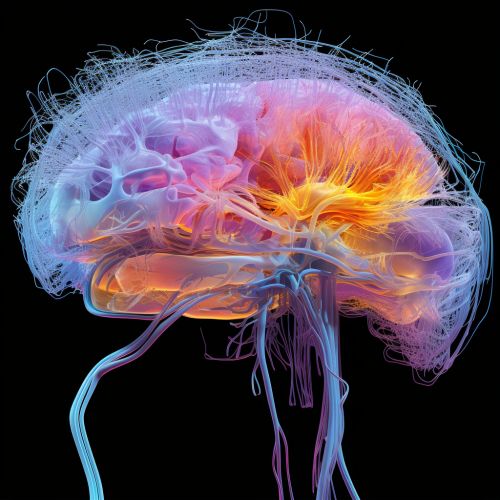Anterior cingulate cortex
Anatomy
The anterior cingulate cortex (ACC) is a part of the brain's limbic system. The ACC is located in the middle of the brain, near the front, just above the corpus callosum. This region of the brain is involved in several complex cognitive and emotional functions.


Structure
The ACC is divided into two main parts: the ventral ACC (vACC) and the dorsal ACC (dACC). The vACC is connected to the "emotional" parts of the brain, such as the amygdala, and is involved in regulating emotions. The dACC is connected to the "cognitive" parts of the brain, such as the prefrontal cortex, and is involved in functions like decision making and impulse control.
Function
The ACC plays a crucial role in several complex cognitive and emotional processes. These include decision-making, empathy, impulse control, emotion, and reward anticipation. It is also involved in certain higher-level functions such as conflict monitoring, error detection, and it plays a role in the modulation of pain perception.
Decision Making
The ACC is heavily involved in the decision-making process. It is thought to contribute to the evaluation of potential reward and the cost of a decision, as well as monitoring the outcomes of those decisions. This is particularly true in situations that involve uncertainty or conflict.
Emotion
The ACC has been linked to emotion through its connections with the amygdala, a part of the brain that plays a key role in emotional processing. The ACC is thought to be involved in the regulation of emotional responses, particularly in relation to fear and sadness.
Pain Perception
The ACC is also involved in the perception of pain. It is not directly responsible for the sensory aspect of pain, but rather the emotional response to it. This is why the ACC is often activated during tasks that require a person to endure pain or discomfort.
Clinical Significance
Abnormalities or damage to the ACC have been linked to a number of mental health disorders, including depression, bipolar disorder, schizophrenia, and post-traumatic stress disorder (PTSD). It is also thought to play a role in chronic pain and addiction.
Mental Health Disorders
In individuals with depression, the ACC is often found to be smaller and less active than in healthy individuals. Similarly, individuals with bipolar disorder often show abnormal activity in the ACC during manic or depressive episodes. In schizophrenia, the ACC is often smaller and shows abnormal activity, particularly during tasks that require conflict monitoring or error detection.
Chronic Pain and Addiction
The ACC's role in pain perception has led to its implication in chronic pain conditions. In these conditions, the ACC is often hyperactive, suggesting an overactive pain response. The ACC is also involved in addiction, particularly in the anticipation of reward, which is a key factor in drug addiction.
